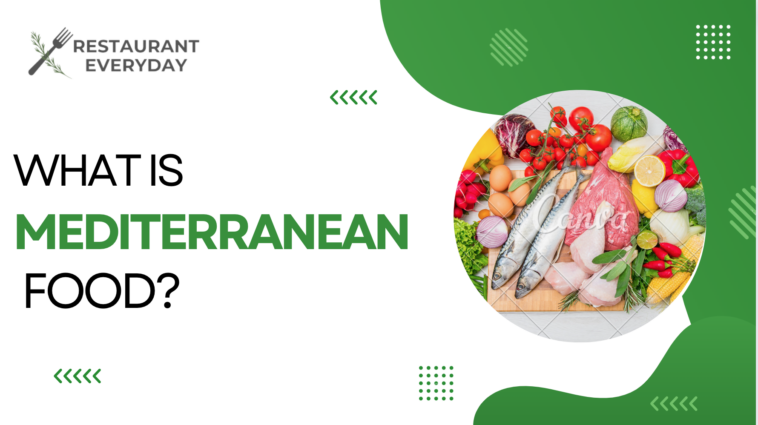Introduction of Mediterranean Food:
Mediterranean cuisine, renowned for its rich flavors and healthful ingredients, is a culinary tapestry woven from the diverse cultures surrounding the Mediterranean Sea. This region’s gastronomy has captivated food enthusiasts globally, offering a delightful combination of fresh Produce, aromatic herbs, and robust olive oils.
1- Overview of Mediterranean Cuisine:
Mediterranean cuisine is a vibrant and diverse culinary tradition that encompasses the rich tapestry of flavors, ingredients, and cooking styles found in the countries surrounding the Mediterranean Sea. This region’s gastronomy is characterized by a harmonious blend of simplicity, freshness, and nutritional richness, making it a celebrated and influential part of global culinary culture.
At its core, Mediterranean cuisine reflects the lifestyle and agricultural practices of the Mediterranean region. The diet strongly emphasizes locally sourced, seasonal ingredients, resulting in dishes that are not only delicious but also nutritionally balanced. The Mediterranean approach to cooking is less about elaborate techniques and more about allowing the natural flavors of high-quality ingredients to shine through.
The cuisine draws inspiration from the diverse cultural influences that have shaped the Mediterranean throughout history. The ancient civilizations of Greece, Rome, Persia, and Egypt, as well as the later contributions of Arab, Ottoman, and Moorish cultures, have all left indelible marks on the region’s culinary landscape.
Olive oil, a cornerstone of Mediterranean cooking, is used abundantly and is vital in imparting distinct flavors to dishes. Herbs such as rosemary, thyme, oregano, and basil contribute aromatic layers to many recipes. Grains, mainly wheat and barley, form the basis for various breads and pastas, while abundant fresh fruits and vegetables add color, texture, and nutritional value to meals.
Seafood, reflecting the region’s proximity to the Mediterranean Sea, plays a prominent role in many dishes. Fish and shellfish are often prepared with simple yet flavorful techniques, showcasing the quality of the ingredients.
Mediterranean cuisine is not only a feast for the taste buds but also a celebration of a holistic approach to dining. Meals are often enjoyed in a relaxed and social setting, emphasizing the cultural Significance of food as a shared experience. With its historical roots and timeless appeal, this culinary tradition continues to captivate food enthusiasts worldwide, offering a delicious and healthful journey through the flavors of the Mediterranean.
2- History and Influences:
The culinary legacy of Mediterranean cuisine is deeply rooted in history, evolving over millennia due to diverse cultural influences and the ebb and flow of civilizations around the Mediterranean Sea.
Ancient Origins:
The foundations of Mediterranean cuisine can be traced back to ancient civilizations, notably the Greeks and Romans. These cultures laid the groundwork for agricultural practices, trade routes, and culinary techniques, shaping the region’s food traditions. The use of herbs, grains, and olive oil can be traced back to these ancient times, forming the bedrock of the Mediterranean diet.
Diverse Cultural Influences:
The Mediterranean has been a crossroads of cultures for centuries, with various civilizations leaving their imprint on the cuisine. Arab, Ottoman, and Moorish influences brought spices, citrus fruits, and intricate cooking methods, enriching the flavor profiles of Mediterranean dishes. The exchange of culinary ideas during the Renaissance further diversified the region’s gastronomy.
Trade Routes and Ingredients:
The Mediterranean’s historical role as a hub for trade connected distant lands, introducing new ingredients to the region. Spices from the East, tomatoes from the Americas, and citrus fruits from Asia all found their way into Mediterranean kitchens, creating a fusion of flavors that continues to define the cuisine.
Greek and Roman Contributions:
Greek and Roman culinary practices emphasized using fresh, local ingredients, laying the groundwork for the Mediterranean diet. Olive oil, bread, and abundant fruits and vegetables were staples. The communal dining and feasting concept, often associated with Greek symposia and Roman banquets, remains a cultural hallmark.
Arab and Moorish Influences:
The Arab expansion in the Middle Ages brought a wealth of spices, such as cinnamon, cumin, and coriander, transforming the Mediterranean palate. Moorish rule in regions like Spain introduced rice, almonds, and citrus fruits, leaving a lasting impact on the culinary landscape.
Ottoman Culinary Heritage:
The Ottoman Empire, spanning three continents, significantly influenced Mediterranean cuisine. The use of Yogurt, diverse meat preparations, and the rich array of sweets known as Turkish delight are enduring legacies of Ottoman culinary traditions.
In essence, Mediterranean cuisine is a tapestry woven from the threads of countless cultures and historical periods. Its evolution reflects the interconnectedness of societies, the exchange of culinary knowledge, and the enduring appeal of fresh, wholesome ingredients prepared with a touch of cultural flair. This rich history continues to shape Mediterranean dishes’ vibrant and varied flavors today.
3- Key Ingredients and Flavors:
Mediterranean cuisine is distinguished by a unique blend of wholesome ingredients and robust flavors, each contributing to the region’s culinary offerings’ distinctive taste and healthful reputation.
1. Olive Oil:
Central to Mediterranean cooking is the use of olive oil, often referred to as “liquid gold.” This heart-healthy fat serves as a cooking medium and imparts a rich, fruity flavor to dishes. Its versatility extends to dressings, dips, and marinades, enhancing the overall taste profile of Mediterranean cuisine.
2. Herbs:
Aromatic herbs play a crucial role in Mediterranean dishes, adding depth and fragrance. Rosemary, thyme, oregano, basil, and parsley are commonly used to infuse flavor into everything from grilled meats and vegetables to sauces and stews. These herbs contribute to the fresh and vibrant character of the cuisine.
3. Grains:
Wheat and barley form the foundation of Mediterranean grains. From Southern Europe’s crusty bread to North Africa’s couscous, grains are staple ingredients. Their versatility allows for various dishes, including pasta, risotto, and bread-based specialties.
4. Seafood:
Given the proximity to the Mediterranean Sea, seafood is abundant and features prominently in the cuisine. Fish such as salmon, sea bass, sardines, and shellfish like shrimp and mussels are prepared with simplicity to showcase their natural flavors.
5. Fresh Produce:
An abundance of fresh fruits and vegetables characterizes Mediterranean cuisine. Tomatoes, eggplants, zucchini, bell peppers, and citrus fruits are staples in many dishes. Their inclusion adds vibrant colors and contributes essential vitamins and minerals.
6. Garlic and Onions:
Garlic and onions are foundational aromatics, providing depth and intensity to Mediterranean recipes. Whether sautéed, roasted, or used in marinades, these ingredients enhance the savory elements of various dishes.
7. Cheese and Yogurt:
Cheese, such as feta, mozzarella, and halloumi, feature prominently in Mediterranean cuisine. These cheeses add a creamy and salty dimension to salads, pastas, and appetizers. Yogurt is another dairy product widely used, particularly in sauces and dips like tzatziki.
8. Nuts and Seeds:
Almonds, walnuts, and pine nuts are frequently incorporated, offering crunch and nuttiness to salads, desserts, and savory dishes. Seeds like sesame and sunflower seeds also appear, contributing texture and flavor.
9. Citrus:
Citrus fruits, including lemons and oranges, provide a zesty brightness to many Mediterranean dishes. The citrusy notes add a refreshing and tangy element to marinades, dressings, or desserts.
10. Mediterranean Spices:
While not as dominant as in other cuisines, certain spices like cumin, coriander, and cinnamon add subtle complexity to Mediterranean dishes, especially those influenced by Arab and Moorish culinary traditions.
Combining these key ingredients creates a harmonious and healthful dining experience, reflecting the Mediterranean commitment to using fresh, seasonal, and locally sourced components. The resulting flavors are delicious and contribute to the well-documented health benefits of the Mediterranean diet.
4- Popular Mediterranean Dishes:
Mediterranean cuisine boasts diverse mouthwatering dishes that showcase the region’s culinary richness. These popular dishes, celebrated for their flavors and cultural Significance, have become iconic representations of Mediterranean gastronomy.
1. Greek Moussaka:
A layered casserole featuring eggplant, minced meat (often lamb or beef), and a savory béchamel sauce. Baked to perfection, Greek Moussaka is a hearty and comforting dish.
2. Italian Pasta Dishes:
Italian pasta dishes are diverse and beloved, from classic Spaghetti Bolognese to seafood-rich Linguine alle Vongole. Each region contributes its variations, incorporating local ingredients and culinary traditions.
3. Spanish Paella:
A flavorful rice dish from Valencia, Spain, paella combines saffron-infused rice with an assortment of seafood, chicken, rabbit, and vegetables. This one-pan wonder is a culinary symbol of Spanish hospitality.
4. Turkish Kebabs:
Turkey is renowned for its succulent kebabs, featuring marinated and grilled meat, often served with flatbreads, yogurt-based sauces, and fresh vegetables.
5. Moroccan Tagine:
A slow-cooked stew prepared in a distinctive conical clay pot, the Tagine typically includes tender meat (such as lamb or chicken), dried fruits, and an aromatic blend of spices, creating a symphony of flavors.
6. Italian Margherita Pizza:
A Neapolitan classic, the Margherita pizza is a simple yet iconic creation topped with tomato, mozzarella, fresh basil, and a drizzle of olive oil. Its name pays homage to Queen Margherita of Italy.
7. Lebanese Hummus:
Hummus is a staple in Lebanese cuisine, a versatile dip made from chickpeas, tahini, garlic, and lemon juice. It’s often served with flatbreads or as a flavorful accompaniment to various dishes.
8. Spanish Gazpacho:
A refreshing cold soup made from tomatoes, peppers, onions, garlic, and cucumbers, gazpacho is a quintessential Spanish dish, perfect for warm weather.
9. Italian Caprese Salad:
A simple and elegant salad featuring fresh tomatoes, mozzarella cheese, basil leaves, and a drizzle of balsamic glaze. The Caprese salad highlights the beauty of quality ingredients.
10. Moroccan Couscous:
Couscous, steamed and fluffed to perfection, is a staple in Moroccan cuisine. It is a versatile base for various stews, often featuring a delightful mix of meats, vegetables, and aromatic spices.
These dishes represent just a fraction of Mediterranean cuisine’s diverse and beloved offerings. Each word reflects its region’s cultural identity, emphasizing fresh, quality ingredients and the artistry of simple yet flavorful preparation methods.
5- Health Benefits of Mediterranean food:
Mediterranean cuisine has long been associated with many health benefits, earning it a reputation as one of the world’s healthiest diets. Combining nutrient-rich ingredients and mindful cooking practices positively affects overall well-being.
1. Heart Health:
The Mediterranean diet is renowned for its heart-protective benefits. The consumption of heart-healthy fats, primarily from olive oil and fatty fish, is associated with lower levels of cholesterol and a reduced risk of cardiovascular diseases.
2. Rich in Antioxidants:
The abundance of fruits, vegetables, herbs, and olive oil in Mediterranean dishes provides a rich source of antioxidants. These compounds help combat oxidative stress and inflammation, potentially lowering the risk of chronic diseases.
3. Omega-3 Fatty Acids:
Fatty fish, a staple in Mediterranean cuisine, is a source of omega-3 fatty acids. These essential fats have been linked to improved cardiovascular health, cognitive function, and a reduced risk of certain chronic conditions.
4. Balanced Nutrition:
Mediterranean meals emphasize a balanced nutrient intake, incorporating various food groups. This balance contributes to maintaining a healthy weight and supporting overall nutritional needs.
5. Fiber-Rich Diet:
Including whole grains, legumes, fruits, and vegetables ensures a diet high in dietary fiber. Adequate fiber intake supports digestive health, helps regulate blood sugar levels, and promotes a feeling of fullness.
6. Reduced Risk of Diabetes:
The Mediterranean diet has been associated with a lower risk of developing type 2 diabetes. The emphasis on whole grains, lean proteins, and monounsaturated fats may improve insulin sensitivity.
7. Lower Incidence of Certain Cancers:
Some studies suggest that adherence to the Mediterranean diet is associated with a reduced risk of certain cancers, particularly those of the breast and colorectal areas. The diet’s anti-inflammatory properties may play a role in this protective effect.
8. Improved Cognitive Function:
The Mediterranean diet’s combination of omega-3 fatty acids, antioxidants, and anti-inflammatory foods may support cognitive function and reduce the risk of age-related cognitive decline.
9. Weight Management:
The Mediterranean diet’s focus on nutrient-dense foods, portion control, and various flavors contributes to sustainable weight management. It encourages a satisfying and enjoyable approach to eating.
10. Longevity:
Regions where the Mediterranean diet is prevalent, such as certain areas of Greece and Italy, have been associated with increased longevity. The combination of a healthful diet, active lifestyle, and strong social connections likely contributes to this phenomenon.
In conclusion, the Mediterranean diet goes beyond culinary enjoyment; it promotes a lifestyle that supports overall health and well-being. Its emphasis on fresh, whole foods and a balanced approach to Nutrition has made it a model for those seeking a delicious dining experience and a path to long-term health.
6- Cultural Significance of Mediterranean Food:
Mediterranean cuisine extends beyond mere sustenance; it is deeply interwoven with the cultural fabric of the regions surrounding the Mediterranean Sea. The culinary traditions and practices hold profound meaning, reflecting the communities’ history, lifestyle, and social bonds that have shaped this vibrant and diverse cultural heritage.
1. Social Gatherings:
Food in the Mediterranean is not just a means of nourishment but a catalyst for social interaction. Meals are often communal affairs, bringing together family and friends to share the joy of dining. Long, leisurely meals with multiple courses encourage conversation, laughter, and the strengthening of social bonds.
2. Festivals and Celebrations:
Mediterranean cultures celebrate their heritage through festivals and events centered around food. Whether it’s the Greek Easter feast, the Spanish La Tomatina festival, or the Italian Sagre celebrating local harvests, these events highlight the cultural importance of sharing meals in a festive and communal atmosphere.
3. Culinary Traditions:
Each Mediterranean region boasts its culinary traditions, passed down through generations. From the art of pasta-making in Italy to the intricate spice blends of Moroccan cuisine, these traditions preserve cultural identity and reflect the history and values of the communities.
4. Seasonal Eating:
Mediterranean cuisine is closely tied to the seasons, emphasizing fresh, locally sourced ingredients. Seasonal Eating not onlythe highest quality and flavor but alsoands people to the rhythms of nature, fostering a sense of harmony with the environment.
5. Agricultural Practices:
The cultivation of olive trees, vineyards, and other staple crops has shaped the agricultural practices of the Mediterranean. These practices, often handed down through generations, contribute to the sustainability and authenticity of the cuisine.
6. Culinary Skills and Techniques:
Mediterranean cooking is an art form with specific techniques and skills passed down from generation to generation. Whether it’s the art of making perfect risotto in Italy or the intricate preparation of Moroccan tagines, these culinary skills are cherished aspects of cultural heritage.
7. Symbolic Significance:
Certain dishes hold symbolic meaning in Mediterranean cultures. For example, breaking bread in Greece or serving couscous in Morocco is not just about nourishment but carries symbolic weight, representing unity, hospitality, and cultural pride.
8. Historical Influence:
The historical interactions and conquests in the Mediterranean have left indelible marks on the cuisine. Ingredients, cooking methods, and flavors have been exchanged and blended, creating a mosaic of culinary diversity that reflects the region’s complex history.
9. Rituals and Ceremonies:
Mediterranean cultures often have culinary rituals and ceremonies associated with life events. From weddings to religious holidays, preparing and sharing specific dishes become integral to these cultural rites, reinforcing a sense of identity and continuity.
10. Fusion of Cultures:
The Mediterranean has been a melting pot of diverse cultures for centuries. The fusion of culinary influences from Greeks, Romans, Arabs, Ottomans, and more has resulted in a cuisine that transcends borders, representing a shared cultural heritage while celebrating individual uniqueness.
In essence, Mediterranean cuisine is not just about what is on the plate; it’s a celebration of cultural identity, a testament to the resilience of traditions, and a medium for creating and strengthening social connections. Sharing a meal is a cultural cornerstone that embodies the warmth, generosity, and richness of Mediterranean cultures.
Conclusion: What is Mediterranean Food
Mediterranean cuisine is a testament to the profound interplay between culture, history, and the art of nourishment. Beyond its delectable flavors and healthful ingredients, this culinary tradition is a vibrant tapestry that weaves together the stories of diverse civilizations bordering the Mediterranean Sea.
From the ancient origins shaped by Greek and Roman civilizations to the intricate spice blends introduced by Arab and Moorish influences, the Mediterranean’s culinary evolution mirrors the rich tapestry of its history. This cuisine has transcended time, offering a timeless connection to the past while adapting to the ever-changing influences of the present.
Key ingredients like olive oil, herbs, grains, and seafood contribute to the distinctive flavors and reflect the region’s commitment to simplicity and freshness. These ingredients, coupled with the emphasis on communal dining, transform meals into social gatherings that foster relationships and strengthen cultural bonds.
Moreover, the health benefits of the Mediterranean diet have elevated it beyond a mere culinary preference to a global model for mindful and nutritious Eating. The focus on heart-healthy fats, antioxidants, and a balanced nutritional approach has garnered attention from health enthusiasts and researchers alike.
Culturally, Mediterranean cuisine is a celebration of life’s milestones, a reflection of agricultural practices, and a symbol of unity and hospitality. Whether it’s the joyous festivals, the symbolic breaking of bread, or the culinary traditions passed down through generations, each aspect reflects a cultural richness that transcends culinary boundaries.
In conclusion, Mediterranean food offers more than just a delightful culinary experience. It provides a holistic journey through time, culture, and flavors, inviting individuals to savor not only the taste of the food but also the stories embedded within each dish. As we continue to appreciate and embrace the diversity of this culinary heritage, we find that Mediterranean cuisine is a timeless invitation to savor the richness of life and the shared human experience.




